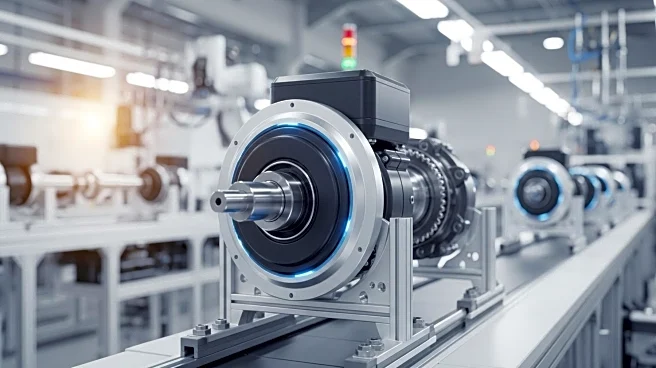What's Happening?
Mercedes-Benz has commenced production of electric drive units (EDUs) for its upcoming all-electric GLC SUV at the Star Assembly plant in Sebeș, Romania. This development marks a significant milestone in Mercedes-Benz's transition towards an all-electric future. The Sebeș facility, a wholly owned subsidiary of Mercedes-Benz AG, is now a crucial part of the brand's global electric vehicle production network. It supplies advanced powertrain components to vehicle plants in Bremen, Germany, and will soon extend its supply to Kecskemét, Hungary. The move underscores Mercedes-Benz's commitment to expanding its electric vehicle offerings and enhancing its production capabilities to meet growing demand.
Why It's Important?
The initiation of electric drive unit production in Romania is a strategic step for Mercedes-Benz as it seeks to strengthen its position in the electric vehicle market. By expanding its production capabilities, Mercedes-Benz is better equipped to meet the increasing demand for electric vehicles, which is crucial for maintaining competitiveness in the automotive industry. This development also highlights the company's commitment to sustainability and reducing carbon emissions, aligning with global trends towards cleaner transportation solutions. The expansion of production facilities in Europe may also have economic implications, potentially boosting local economies and creating job opportunities in the region.
What's Next?
As Mercedes-Benz continues to ramp up its electric vehicle production, the company is likely to focus on further expanding its global production network. This may involve increasing investments in existing facilities and exploring new locations for production. Additionally, Mercedes-Benz may intensify its marketing efforts to promote its electric vehicle lineup, aiming to capture a larger share of the market. The company will also need to address challenges related to supply chain management and ensure the efficient distribution of components to various production sites.
Beyond the Headlines
The shift towards electric vehicle production by major automakers like Mercedes-Benz reflects broader industry trends and consumer preferences for sustainable transportation options. This transition may lead to significant changes in the automotive supply chain, with increased demand for components specific to electric vehicles, such as batteries and electric drive units. Furthermore, the move towards electrification may prompt regulatory changes and incentives from governments to support the adoption of electric vehicles, potentially influencing public policy and environmental standards.









